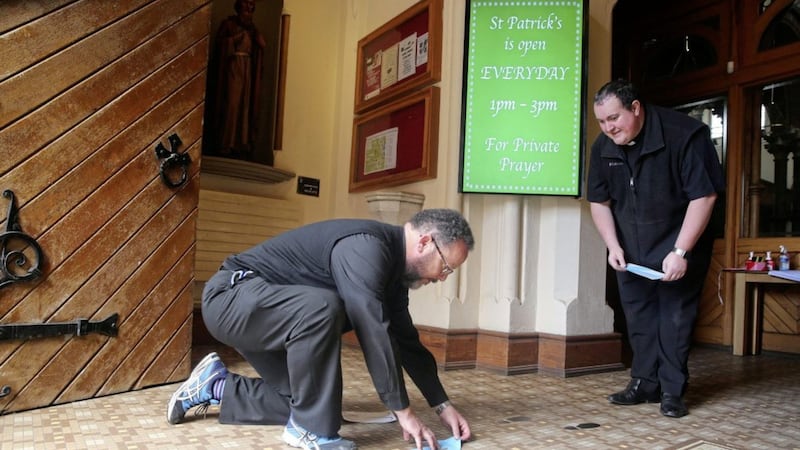Churchgoers may have to make online bookings to attend Mass and could be encouraged to wear face coverings when churches reopen at the end of the month.
Under new guidelines published in a framework document, priests and parishes across Ireland are being asked to make a number of changes to prepare for public worship.
Among the measures, priests are being asked to set up a Covid-19 support team of parishioners to organise preparations and to oversee changes made in the church.
Parishes have also been told to secure an appropriate supply of signage, cleaning/sanitising materials and accessories and items necessary for protection.
Priests are also being asked for the number of people that can attend their church, and how that will be communicated to parishioners.
In a statement from the Irish Catholic Bishops' Conference, it said: "At the end of the month we hope to slowly and cautiously resume public worship in our churches, knowing that it can only happen in a limited way.
"We will still need patience, perseverance and self-sacrifice.
"The prescriptions contained in this Framework Document will only be effective if we have the generous support of volunteers who will help to plan, implement and manage the transition back to full parish life and the celebration of the sacraments.
"In this regard we appeal particularly to the younger members of our parishes.
"Their energy, creativity and enthusiasm are gifts that our communities need now more than ever, since some of our older generation may be unable to offer their normal help in the current circumstances.
"The resumption of public worship should not mean simply going back to where we were before."
Priests have been warned that no church should be opened for public prayer or worship until "satisfactory arrangements" have been put in place.
Under the guidelines, reusable prayer books, hymnals and hymn sheets are not being distributed, while secure and supervised collection boxes will be placed near the doors of the church.
Priests have also been asked to accommodate people with special needs.
Church officials have also said that the optional exchange of the Sign of Peace can be omitted, or "offered in a manner which avoids any physical contact".
The advice also stated: "The procession for people approaching for Holy Communion should be carefully planned. Stewards may assist if required.
"For the time being, it is recommended that Communion should not be given under both kinds, and should be received in the hand.
"Priests and Extraordinary Ministers of Holy Communion should visibly sanitise their hands both before and after the distribution of Communion."
Priests and ministers have also been told they should wear a face covering while distributing Communion.
Archbishop Diarmuid Martin, however, told RTÉ that there is no "full agreement" on how priests should serve Communion.
He said that some priests have suggested wearing coverings, while others said there should be a plastic shield.
Archbishop Martin also said it was "prudent" for people to wear masks during mass and they are also considering whether to introduce an online booking system to ensure all parishioners can attend Mass while adhering to social distancing.
Other advice includes:
- Care should be taken to thoroughly clean all vessels and to change purificators and finger towels after each Mass.
- At the celebration of the Sacrament of Baptism, the celebrant will sign the child with the Cross without touching.
- The anointing with the Holy Oils will be administered by the use of cotton buds.
- Each Diocese should plan for the clear and effective communication of all necessary protocols and procedures to all parishes in the Diocese.







